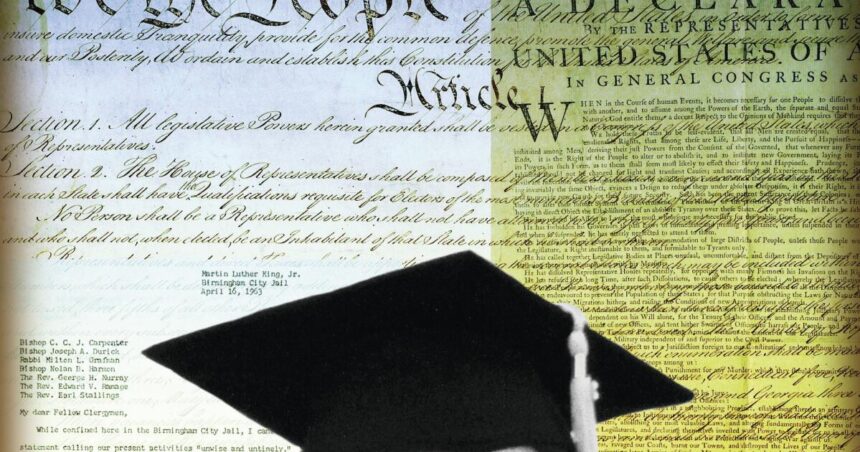On the first day of his American National Government class, Professor Kevin Dopp asked how many of his students were American citizens. Every hand was raised.
“So how did you become citizens?” he asked. “Did you pass the exam?”
“No,” one young woman replied hesitantly, “we were born here.”
That’s a good thing: After years of helping students at the University of South Carolina-Beaufort take the test required of immigrants seeking U.S. citizenship, he says most students would be rejected.
“Only 30 to 35 percent of students pass,” said Dopf, a retired Army lieutenant colonel and former West Point instructor. “The rest of the students are ignorant. And I mean ignorant.”
Most states require some form of civics education in high school, but with recent surveys showing that a third of American adults cannot name the three branches of the federal government, many think the bar should be set higher.
Over the past few years, a small but growing number of states have started requiring students at public universities to take civics courses, and polls show that civics education is wildly popular across political lines.
Proponents say civics — the study of civic rights and responsibilities — fosters a sense of unity and the ability to deal with disagreements. Many believe it empowers citizens and helps heal America’s divisions. Incorporating civics into higher education means issues can be looked at in more sophisticated ways and integrated into other classes.
“We feel like we’re working to advocate for America,” said Louise Dubé, director of iCivics, which promotes civic education.
But what does it mean when people who talk about civil rights often – well, they can’t exercise their civil rights?
Take North Carolina, where lawmakers and academics have been locked in a fierce battle over who should decide how civics should be taught.
Last year, Republican lawmakers in North Carolina introduced the REACH Act, an acronym for “Restoring a College Education Based on the Heritage of Our Constitution.” The bill would require undergraduates to take at least three credits on American government and read a series of major American history documents, from the Declaration of Independence to the Rev. Martin Luther King Jr.’s 1963 “Letter from Birmingham Jail.” They would also have to pass a final exam that would count for 20% of their final grade.
Though the bill seemed ordinary on its surface, it was met with fierce backlash. Critics pointed to the bill’s “take back” title, its attempt to enforce the curriculum that is usually set by professors, and the fact that it was drafted by an avowedly conservative US Marine Corps captain and lawyer, Jameson Broggi, who said the curriculum must include a “commitment to American institutions and ideals.”
North Carolina’s bill easily passed the state House of Representatives and received a first reading in the Senate in March 2023. The bill appeared headed for victory.
University of North Carolina officials and faculty were not happy.
“Attempts to delay this in the House have been completely ineffective,” Bart Goodson, senior vice president for government relations at the 16-campus University of North Carolina, wrote to fellow administrators in an April 2023 email obtained by Broggi through a public records request.
“This was a ‘wear the flag’ type of bill, and anyone who spoke out against it was essentially deemed un-American,” Goodson wrote.
So as the idea slowly works its way through the legislative process, UNC faculty decided to take the issue into their own hands.
Wade Maki, president of the University of North Carolina Faculty Senate, worked with professors from four other campuses, including two historically black colleges, to draft a set of learning outcomes. They studied what other states were doing.
The resulting proposal has been described as similar in many ways to the REACH Act, and even adds Abraham Lincoln’s Gettysburg Address to the list of essential documents.
Everyone seemed to want the same thing.
But proponents of mandatory civics education by law were perplexed: Why were teachers opposed to their proposal?
“What are these people afraid of?” asked Michael B. Poliakoff, president and CEO of the American Council of Trustees and Alumni, which helped Brogi write the North Carolina law and a similar bill passed in South Carolina three years ago.
“As if it were too unsettling, too retro, to understand our founding documents and key moments in our nation’s history, right down to the Letter from Birmingham Jail.”
That doesn’t matter, say scholars.
Unlike standards in K-12 schools, university faculty typically determine the content of individual courses, a practice considered central to academic freedom.
“Faculty members are the primary owners of the curriculum,” said Maki, a philosophy professor at the University of North Carolina at Greensboro. “We know what works, but sometimes people outside of higher education don’t know what works.”
The UNC Board of Trustees, made up of 24 members appointed by the Republican-led Legislature, unanimously approved the plan in mid-April. Details are still being worked out, but the requirement would apply to students entering the system starting in July 2025. (Proponents of the NC REACH bill are unhappy with UNC’s plan and have vowed to resume legislative efforts next year.)
At least 10 states (Arkansas, California, Florida, Georgia, Missouri, Nevada, South Carolina, Texas, Utah, and Wyoming) have laws requiring undergraduate students at public universities to take at least one course on American history or government, according to the New York-based conservative group Civic Alliance, and the requirement is on the books, or at least under discussion, in other states.
And the coalition, which rails against “identity politics” and “radical new civil rights activists,” is trying to spread the word.
The group created a document calling for “the study and commitment to America’s extraordinary and honorable history.” The coalition’s executive director, David Randall, said the document “influenced” legislation in Florida, Iowa and Texas, but declined to say how other states had lobbied.
Some state university systems, like UNC, did not wait for legislative mandate to act.
For example, students at Purdue University in Indiana and its satellite campuses can choose from three courses (attending six accredited civics-related events and then writing a reflection, listening to 12 podcasts and taking a series of quizzes, or completing one of 13 politics or history courses) and pass the exam.Faculty in the University of Arizona system are currently developing an “American Institution” curriculum to meet the board’s requirements.
Professors acknowledge that not all students welcome mandatory civics classes.
“Some people think of vegetables as a part of a meal, some think of them as a dessert, some just want to finish a meal,” said David Reingold, dean of Purdue University’s College of Liberal Arts, who oversaw the implementation of the system’s civics program.
American universities, which train K-12 teachers, have been “taken over by a radical regime determined to replace proper civics education with pedagogies such as critical race theory and behavioral civics.”
Fear of political indoctrination carries with it “a power that faculty simply don’t have,” said Whitney Ross Manzo, an associate professor of political science at Meredith College in Raleigh.
“If I could force students to do anything, it would be to read the syllabus and do their homework. I have no power to change their political ideology,” said Manzo, who previously taught in Texas.
Now back in Bluffton, Dopf is putting in the work that needs doing.
After a few introductory remarks, Dopf asks students to grab their pens and paper.
“This is your first test.”
The 14 questions are relatively easy: How many U.S. Senators are there? What are the requirements to become president? How long do House members serve?
Citizenship candidates must pass with six correct answers out of 10. Dopf is asking his students to achieve an even lower standard, seven correct answers out of 14.
As expected, about 70% failed.
One student thought Clarence Thomas was the Chief Justice of the Supreme Court. Another wrote that the Declaration of Independence was signed in 1667.
“How can we miss such a basic truth,” Dopf exclaims indignantly. “We need to give our students better skills for a better democracy.” (To be fair, he notes that 30 percent of West Point cadets also failed the test.)
Audra Hillman, an 18-year-old freshman from Wake Forest, North Carolina, took two politics classes in high school. So how did she do?
“I probably would have been kicked out,” she says with a nervous laugh.
Hillman hopes to eventually work with children with disabilities, but she isn’t frustrated about having to cram in this civics class.
“Everybody should vote,” she said. “It’s your duty as an American citizen. And I think everybody should get out and get educated.”
Breed and Sullivan contributed to The Associated Press.









